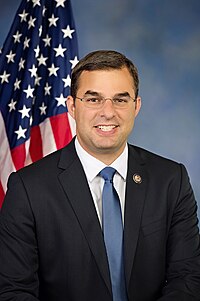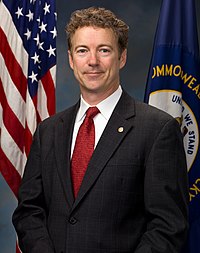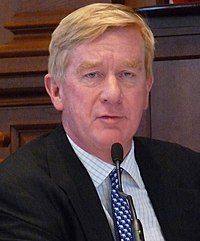In American politics, a Libertarian Republican is a politician or Republican Party member who has advocated Libertarian policies while typically voting for and being involved with the Republican Party.
Beliefs and size
editThe Republican Party has historically been divided into factions. In 2012, the libertarian branch of the party was described as smaller than other branches, including Tea Party voters (the "populist, Pro-limited government Tea Party wing" of the party), pragmatic "Main Street" Republicans, and evangelical Christian conservatives.[1]According to a 2012 New York Times analysis, libertarian Republicans have a variety of motivating issues. On economic and domestic policy, they favor deregulation and tax cuts, repeal of the Affordable Care Act, and protecting gun rights.[1] On social issues, they favor privacy and oppose the USA Patriot Act and oppose the War on Drugs.[1] On foreign and defense policy, libertarian Republicans are non-interventionists.[1] Some libertarians favor abortion rights, while other libertarian Republicans oppose abortion.[1] Two-thirds of libertarian Republicans are males.[1]
In a 2014 Pew Research Center survey on political typology and polarization, 12% of Republicans described themselves as libertarian.[2] In a 2023 New York Times poll of the Republican coalition, 14% of Republicans were considered Libertarian conservatives. As of August 2023, 38% support providing additional support to Ukraine, 34% support cutting corporate taxes over raising tariffs, 19% consider themselves very conservative, 45% believe abortion should be mostly or always legal, 51% are against comprehensive immigration reform, 73% say they favor the "protection of individual freedom over traditional values", and 13% want a candidate who would "fight corporations that promote woke left ideology." In the 2024 Republican Party presidential primaries, 43% would vote for Donald Trump and 12% would vote for Ron DeSantis.[3]
Organizations
editThe Republican Liberty Caucus, which describes itself as "the oldest continuously operating organization in the Liberty Republican movement with state charters nationwide," was founded in 1991.[4] In the 1990s the group's chairs included Chuck Muth, Roger MacBride, and Congressman Ron Paul; in the 2000s, the group's chairs included Dave Nalle.[4] The group's statement of principles affirms "the principle that individual rights and liberties are unlimited" and calls for free trade; the "privatization of all government assets"; the abolition of many federal agencies; the repeal of most current federal taxes in favor of a single flat income tax or national sales tax; and the phase-out of "compulsory government retirement, disability, and health programs."[5]
The House Liberty Caucus is a congressional caucus formed by Libertarian Representative Justin Amash of Michigan, at the time a Republican. In 2014, the group "consisted of about 30 libertarian-inclined Republicans (and occasional Democratic visitors like Jared Polis)."[6] In February 2019, Politico reported that the House Liberty Caucus had eight members.[7] The list of congressional member organizations (CMOs) for the 118th Congress indicates that Warren Davidson is the leader of the Congressional Liberty Caucus.[8]
Public figures
edit






Cabinet-level officials
edit- Former Director Mick Mulvaney of the Office of Management and Budget; former acting White House Chief of Staff; former U.S. Representative from South Carolina[9]
Representatives
edit- Representative Thomas Massie of Kentucky – described as "a Northern Kentucky Republican with libertarian leanings,"[10] Massie is a "self-styled libertarian"[11] who has received libertarian support, although he has also described himself as a "'constitutional conservative' within the Republican Party."[12]
- Representative Matt Gaetz of Florida – self-describes as a "libertarian populist" and described by media as having a "strong libertarian streak".[13][14]
- Representative Tom McClintock of California – described as "libertarian leaning" by Reason magazine.[15]
- Representative Nancy Mace of South Carolina - Described to have a "fusion" of Libertarian views[16]
Former representatives
edit- Former Representative Justin Amash of Michigan – Chairman of the Liberty Caucus; left Republican Party in 2019 to become an Independent. He is now a registered member of the Libertarian Party and thus became the first Libertarian member to hold a seat in Congress.[17] In 2024, however, he announced he would run for U.S. Senate as a Republican.[18]
- Former Representative Denver Riggleman of Virginia[19]
- Former Representative Dana Rohrabacher of California[20]
- Former Representative Mark Sanford of South Carolina (also a former governor of South Carolina) – a Republican, he's often described as holding libertarian views;[21] claimed to have turned down an offer from Libertarian Party presidential nominee Gary Johnson to be his vice presidential running mate in the 2016 election.[22]
- Former Representative Ted Yoho of Florida[23]
- Former Representative Bob Barr of Georgia[24]
- Former Representative Kerry Bentivolio of Michigan[25]
- Former Representative Connie Mack IV of Florida – described as "a staunch fiscal conservative...with libertarian tendencies."[26]
- Former Representative Ron Paul of Texas – longstanding Libertarian Republican icon; unsuccessfully ran for president in 1988 as the Libertarian nominee, and in 2008 and 2012 as a Republican candidate.[27][28]
Senators
edit- Rand Paul, U.S. Senator from Kentucky (2011–present) – is sometimes regarded as libertarian-leaning,[29] and has on multiple occasions described himself as such when discussing matters like the national debt and other economic issues, domestic surveillance, foreign military intervention, and the war on drugs. However, David Boaz of the Cato Institute notes that "Paul doesn't claim to be a libertarian, and he takes positions that many libertarians disagree with."[30]
- Mike Lee, U.S. Senator from Utah (2011–present) – described as an economic and civil libertarian.[31][32]
Former senators
edit- Barry Goldwater, former U.S. Senator from Arizona (1953–1965, 1969–1987)[33]
- Mark Hatfield, former U.S. Senator from Oregon (1967–1997)[34]
- Jeff Flake, former U.S. Senator from Arizona (2013–2019)[35]
State governors
edit- Chris Sununu, 82nd Governor of New Hampshire (2017–present) – As a Republican governor of New Hampshire, Sununu has been described as a "moderate-libertarian".[36]
Former governors
edit- William Weld, 68th Governor of Massachusetts (1991–1997) – As a Republican governor of Massachusetts, Weld self-identified as a libertarian Republican.[37] Later, Weld drifted toward the Libertarian Party. In 2006, Weld unsuccessfully sought the Republican nomination for New York governor; he gained the Libertarian Party endorsement that year before dropping out of the race.[38] In 2016, Weld joined the Libertarian Party to run for vice president as the running mate of Gary Johnson.[39] In 2019, Weld rejoined the Republican Party to launch a primary challenge to President Donald Trump.[40]
State legislators
edit- Nick Freitas, Virginia state Delegate (2015–present) – Unsuccessfully ran for U.S. Senate in 2018. Described as having a "conservative voting record and libertarian streak."[41]
- Anthony Sabatini, Florida state representative (2018–present) – candidate for 2022 United States House of Representatives elections in Florida for Florida's 7th congressional district. Described as a "libertarian-conservative".[42]
Former
edit- Eric Brakey, former Maine state senator (2014–2018) Unsuccessfully ran for U.S. Senate in 2018. Worked for Ron Paul's 2012 campaign, led the Defense of Liberty PAC.[43]
- Richard Tisei, former Massachusetts state senator and state Senate minority leader; identifies as a "traditional Northeast libertarian" in the social and fiscal senses.[44]
Authors and scholars
edit- Nobel Prize–winning economist Milton Friedman[45]
Others
edit- Glenn Jacobs, professional wrestler with WWE and current Republican Mayor of Knox County, Tennessee.[46][47]
- Kennedy, TV commentator and former MTV VJ[48]
- Grover Norquist, anti-tax activist and Republican figure; economic libertarian identified with "support for supply-side economics and skepticism about climate science."[49][50]
- P. J. O'Rourke, humorist, author – libertarian-conservative Republican, although he endorsed Democratic nominee Hillary Clinton in the 2016 presidential campaign.[51][52]
- Austin Petersen, former Libertarian Party presidential candidate and former Republican candidate for US Senate in Missouri in 2018.[53]
- Wayne Allyn Root, author and radio host[54]
- Peter Schiff, investment broker – described as "libertarian" or "libertarian-leaning";[55] unsuccessfully sought the Republican nomination for the 2010 election for U.S. Senate in Connecticut.[56]
- Mark Spitznagel, hedge fund manager[57]
- Peter Thiel, Silicon Valley businessman, PayPal co-founder – a registered Republican and self-described libertarian.[58][59]


